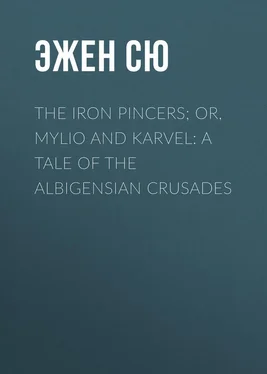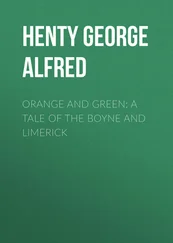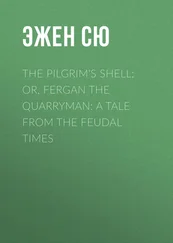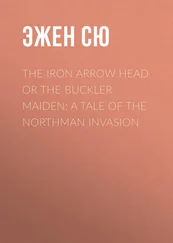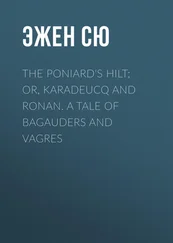Эжен Сю - The Iron Pincers; or, Mylio and Karvel - A Tale of the Albigensian Crusades
Здесь есть возможность читать онлайн «Эжен Сю - The Iron Pincers; or, Mylio and Karvel - A Tale of the Albigensian Crusades» — ознакомительный отрывок электронной книги совершенно бесплатно, а после прочтения отрывка купить полную версию. В некоторых случаях можно слушать аудио, скачать через торрент в формате fb2 и присутствует краткое содержание. Жанр: literature_19, foreign_antique, foreign_prose, на английском языке. Описание произведения, (предисловие) а так же отзывы посетителей доступны на портале библиотеки ЛибКат.
- Название:The Iron Pincers; or, Mylio and Karvel: A Tale of the Albigensian Crusades
- Автор:
- Жанр:
- Год:неизвестен
- ISBN:нет данных
- Рейтинг книги:4 / 5. Голосов: 1
-
Избранное:Добавить в избранное
- Отзывы:
-
Ваша оценка:
- 80
- 1
- 2
- 3
- 4
- 5
The Iron Pincers; or, Mylio and Karvel: A Tale of the Albigensian Crusades: краткое содержание, описание и аннотация
Предлагаем к чтению аннотацию, описание, краткое содержание или предисловие (зависит от того, что написал сам автор книги «The Iron Pincers; or, Mylio and Karvel: A Tale of the Albigensian Crusades»). Если вы не нашли необходимую информацию о книге — напишите в комментариях, мы постараемся отыскать её.
The Iron Pincers; or, Mylio and Karvel: A Tale of the Albigensian Crusades — читать онлайн ознакомительный отрывок
Ниже представлен текст книги, разбитый по страницам. Система сохранения места последней прочитанной страницы, позволяет с удобством читать онлайн бесплатно книгу «The Iron Pincers; or, Mylio and Karvel: A Tale of the Albigensian Crusades», без необходимости каждый раз заново искать на чём Вы остановились. Поставьте закладку, и сможете в любой момент перейти на страницу, на которой закончили чтение.
Интервал:
Закладка:
Eugène Sue
The Iron Pincers; or, Mylio and Karvel: A Tale of the Albigensian Crusades
INTRODUCTION
I, Mylio the Trouvere 1 1 Trouvere was the name given to certain "improvisers," or poets, of northern France. In the south of France the counterpart of the Trouvere was called "troubadour."
– the great-great-grandson of Colombaik, whose father, Fergan the Quarryman, was killed on the ramparts of Laon in the defense of the franchise of the commune – have written this "play," or narrative in dialogue, as is the vogue in these days. 2 2 This form of writing was used by the trouveres of the XIII century, and were called "Jeux," that is, plays, as The Play of the Shepherd and the Shepherdess , by Adam le Hale (Ancient Fables, vol. II, p. 193, Le Grand d'Aussy). In these "plays," which were dialogues, like the modern drama, and which were recited by the strolling trouvere, the dialogue was made to supply the place of descriptions of scenes, etc.
The events herein narrated transpired in the course of the year 1208, at the period when the war of King Philip Augustus against King John of England and against Germany raged at its worst. The description of the "Court of Love," however much I may tone it down, reflects truthfully the unbridled license of the morals that are prevalent in these times, and the description of the persecutions of the Albigensian heretics, however much I may tone down that, truthfully reflects the ferocity of the religious bigotry of this self-same epoch. On the one subject and on the other the facts are revolting. Nevertheless, I am of the opinion that the morals and principles of the noble dames, the seigneurs and the clergy should not be concealed from you, children of Joel. Your knowledge of the facts will strengthen your aversion for these elements of our oppression.
PART I
THE COURT OF LOVE
CHAPTER I
THE ORCHARD OF MARPHISE
What I here have to narrate occurs towards evening on a beautiful autumn day, in the orchard of Marphise, the noble Lady of Ariol. The orchard, which lies in the close vicinity of the ramparts of the city of Blois, is surrounded by a high wall, crowned by a hedge of yoke-elm. A handsome summer-pavilion rises in the middle of the garden. The trees are numerous, and their fruit-laden branches are ingeniously intertwined with vines that bear clusters of purple grapes. Not far from the pavilion, a stately pine-tree casts its shadow across a white marble basin filled with limpid water and encircled by a broad band of lawn, on which roses, anemones and gladiolas blend their lively colors. A bench of verdure is contrived around the foot of the gigantic pine, whose dense foliage allows the setting rays of the sun to penetrate it here and there, and to empurple the crystal face of the water in the basin.
Twelve women, the eldest of whom, Marphise, the Lady of Ariol, has hardly reached her thirtieth year, and the youngest, Eglantine, Viscountess of Seligny, is not yet seventeen; – twelve women, the least handsome of whom would everywhere, except here, have been considered a star of beauty; – twelve women are assembled in this orchard. After a collation in which the wines of Blois, of Saumur and of Beaugency have moistened the delicate venison pasties, the eels preserved in mustard, the cold partridges seasoned in verjuice – a dainty repast that is rounded with toothsome confectionery and sweets, moistened, in their turn, with no less copious libations of hippocrass or other spiced wines – the eyes of the noble ladies begin to dance and their cheeks are inflamed.
Certain of being alone among themselves, and sheltered from indiscreet looks or inquisitive ears, the merry gossips observe neither in their words nor in their demeanor the reserve that, perhaps, they might observe elsewhere. Some, stretched at full length on the sward, turn the limpid water of the basin into a mirror, contemplate themselves, and make all manner of winsome grimaces at their own reflections in the water; others, perched upon a ladder, amuse themselves plucking the ruddy apples or mellow pears from the trees, and, as the petticoats of the noble ladies serve for aprons in which to gather their harvest, the color of their garters is often exposed – a circumstance that in no wise disturbs our climbers, knowing as they do, that their limbs are well shaped; others, again, hold themselves by the hands in a circle, and amidst peals of laughter indulge in a giddy whirl; while still others, being of a more indolent bent, repose upon the bench of verdure and lazily enjoy the balmy air of the delightful evening.
These indolent ones should be named. They are: Marphise, the Lady of Ariol; Eglantine, Viscountess of Seligny; and Deliane, Canoness of the sacred Chapter of Nivelle. Marphise, tall, dark, with eyebrows boldly arched and of no less deep a hue than her raven-black hair and large black eyes, would have resembled the antique Minerva if, like the goddess, Marphise had worn a brass casque on her head, and if her chest, massive and white as alabaster, were imprisoned in a cuirass, in short, if her physiognomy had recalled the austere dignity of the goddess of wisdom. Fortunately, there is no trace of all that, thanks both to the playful brilliancy of Marphise's eyes and to her laughing, sensual and ruddy lips. Her coif of orange color, with its flaps gently turned above her ears, exposes the strands of her black hair, which are braided with a thread of pearls. Her elegant figure stands outlined under her robe of white silk, a rich Lombard fabric relieved with orange-colored designs. Her sleeves, open and flowing, her upturned collar, her sloping corsage, leave her beautiful arms bare, and expose her under-waistcoat of snow-white linen, fluted, and bordered with gold thread over her bosom. In order to cool her burning cheek, Marphise flutters an ivory-handled fan of peacock feathers. Indolently stretched upon the bench of verdure, the nonchalant woman does not notice that a raised fold of her skirt exposes one of her limbs which tightly fits a stocking of pale green silk with silver ribs, together with her dainty slipper of Lyons manufacture, with a red buckle ornamented with rubies.
Marphise turns with a smile towards Eglantine, who, standing behind the bench of verdure, leans her elbows upon its back. Thus, only the face and corsage of the charming Viscountess of Seligny are visible. She has been well named, Eglantine. Never did the flower of the wild-rose, barely blossomed from the bud, display a more delicate tint, or more vernal, than the enchanting visage of the dainty blonde with eyes as blue as the sky of May. All about her is rosy. Rosy are her cheeks, rosy her lips, roses make up the little chaplet of perfumed flowers which crowns the hair-net of silver thread through the squares of which her deep blonde hair peeps out, and finally, rosy is the silk of her gorget, which, from the waist all the way up to the neck, tightly fastened by a row of marvelously wrought silver buttons, sets off her delicate contour.
While Eglantine thus leans upon her elbows on the bench, Deliane, the Canoness of the Chapter of Nivelle is upon her knees at the opposite side of the verdure seat. With one of her arms familiarly reclined upon the white shoulder of Marphise, she listens smiling to the erotic conversation between Eglantine and the Lady of Ariol. Of the two prattlers, one is of superb beauty, the other of charming prettiness. Deliane the canoness, however, is celestial. Dream of a woman of as divine a beauty as your imagination can conceive; clothe her in a scarlet robe of delicate material bordered with ermine; add to that a surplice of the white of the lily like the hood and veil which frame in the ideal face of the canoness; steep her beautiful hazel eyes in a languor of saintly love; – do that and you will have the portrait of the matchless canoness. That being done, gild the group of these three women with a ray of the setting sun, and you will admit that, at that moment, the orchard of the Lady of Ariol, filled as it is with delicious fruit, greatly resembles the terrestrial Paradise; – aye, surpasses it. For one thing, instead of one solitary Eve, you see here a full dozen – some blonde, some dark, some auburn; for another thing, that boor of an Adam is absent, and absent also is the rainbow colored serpent, unless the villain has hidden himself under some cluster of roses and gladiolas.
Читать дальшеИнтервал:
Закладка:
Похожие книги на «The Iron Pincers; or, Mylio and Karvel: A Tale of the Albigensian Crusades»
Представляем Вашему вниманию похожие книги на «The Iron Pincers; or, Mylio and Karvel: A Tale of the Albigensian Crusades» списком для выбора. Мы отобрали схожую по названию и смыслу литературу в надежде предоставить читателям больше вариантов отыскать новые, интересные, ещё непрочитанные произведения.
Обсуждение, отзывы о книге «The Iron Pincers; or, Mylio and Karvel: A Tale of the Albigensian Crusades» и просто собственные мнения читателей. Оставьте ваши комментарии, напишите, что Вы думаете о произведении, его смысле или главных героях. Укажите что конкретно понравилось, а что нет, и почему Вы так считаете.
